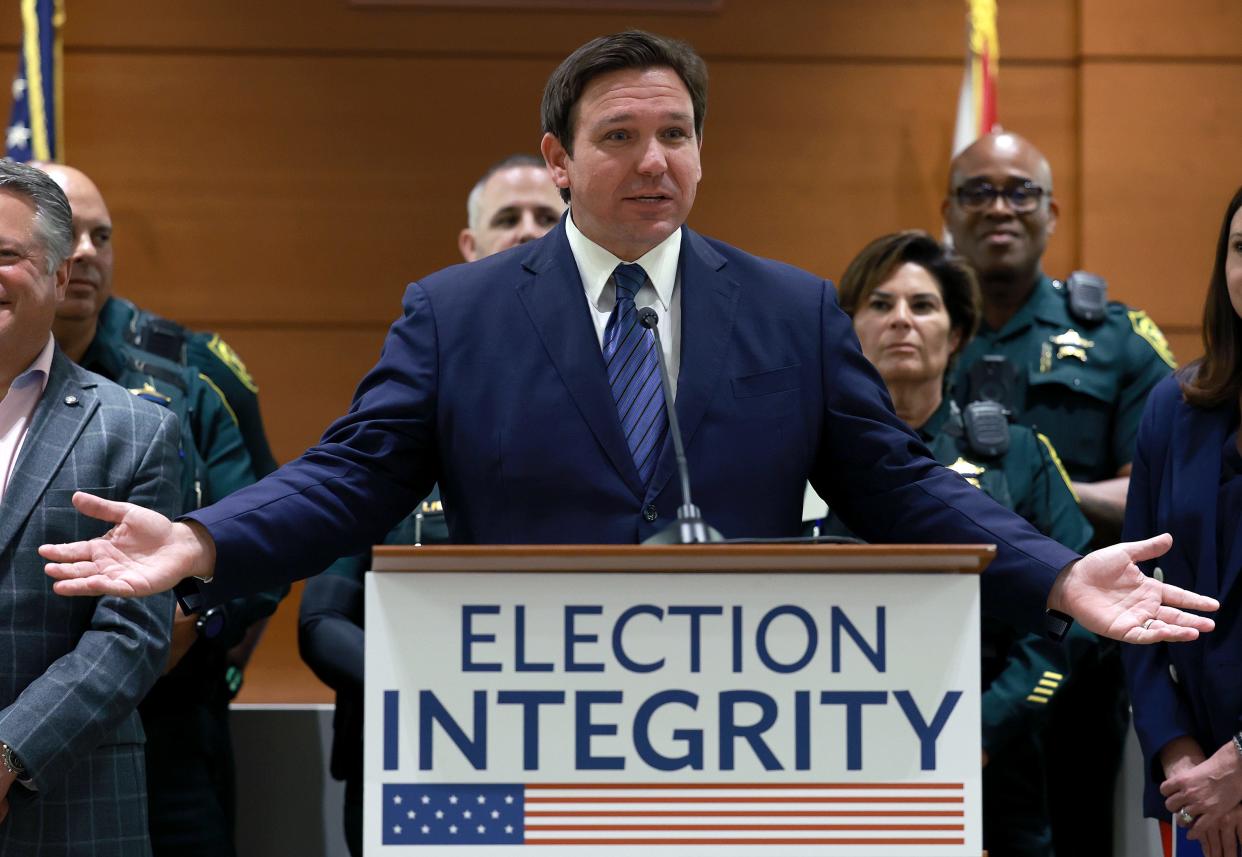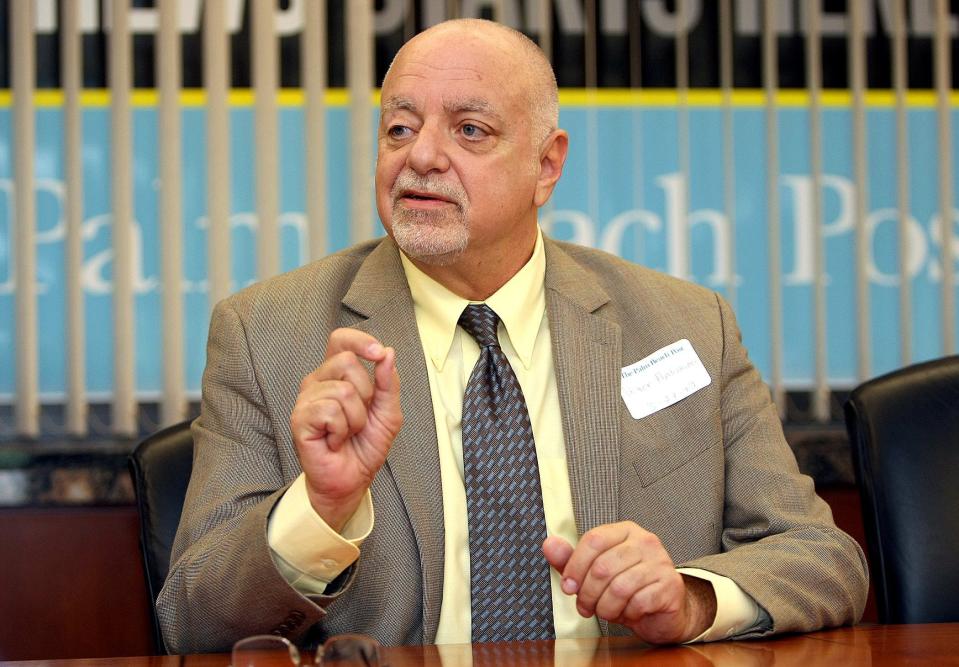Three in Palm Beach County arrested on election fraud charges, face up to 5 years in prison

- Oops!Something went wrong.Please try again later.
Less than a week before the August primary election, three Palm Beach County residents were arrested as part of an investigation by the newly formed state Office of Election Crimes and Security.
More investigations are pending, said Palm Beach County's elections chief.
Robert Simpson of Pahokee, Luis Villaran of Delray Beach and Leo Grant Jr. of South Bay were booked in the Palm Beach County Jail on Thursday for "willfully" affirming falsely on their voter registration forms that their civil rights were restored, and for casting a ballot while ineligible to vote. These charges are third-degree felonies and each came with a $500 bond. If convicted, they face a $5,000 and up to five years in prison.
All three had submitted voter registration forms either in late 2019 or early 2020, each noting that they were not a convicted felon or that they had their right to vote restored.
Governor announces election fraud arrests: DeSantis announces 20 felons charged with voter fraud across Florida
Office of Election Crimes and Security: DeSantis names ex-Palm Beach County State Attorney to head new election crimes office
'My obligation is to follow the law': County elections supervisor details her reasoning for no live streaming of vote counting
In 2018, Florida voters overwhelmingly passed a constitutional amendment restoring felons voting rights after they served their sentences and paid all fines, fees and restitution. But certain offenses were excluded from automatic rights restoration. Simpson, Villaran and Grant committed offenses that precluded automatic voting rights restoration.
Gov. Ron DeSantis announced the arrests during a news conference at the Broward County Courthouse in Fort Lauderdale. So far, 17 people across the state have been arrested in Palm Beach, Broward, Miami-Dade, Orange and Hillsborough counties as part of this effort. These counties have the most registered Democrats in the state. An additional three warrants are active as of Friday, according to the Florida Department of Law Enforcement.
PBC election supervisor said state did not tell her the three were ineligible
But the state had not informed the Palm Beach County elections office that these three residents were ineligible to vote, said Supervisor of Elections Wendy Sartory Link.
After a resident fills out and submits a voter registration form, the county elections office sends the application for processing to the Florida Secretary of State, who oversees the Division of Elections. It is up to the state to notify county election offices if a voter is ineligible, whether their civil rights had not been restored following a felony conviction or a court adjudicated the person mentally incompetent.

Lacking access to the same databases as the state, the only way the county elections office can immediately deem someone ineligible without waiting for the state, Link said, is if the resident marks on their voter application that they are not a U.S. citizen, or that they do not affirm that their civil rights have been restored following a felony conviction or judgment of mental incapacity.
A voting rights expert who testified in the legal action surrounding Amendment 4 said the announcement "highlights not the culpability of the individuals who registered, but the failings of the DeSantis administration's Division of Elections and the failure to have a system in place that can verify an individual's eligibility."
"It's an effort to chill participation by targeting these individuals who were registered to vote by their supervisor of elections and who were vetted by Gov. DeSantis' own Division of Elections with respect to their eligibility," said Dan Smith, a political science professor at the University of Florida. "The state said they were eligible. Why wouldn't they have presumed they were eligible when they received their voter registration cards?"
State Sen. Jeff Brandes, a St. Petersburg Republican who crafted the bill to implement Amendment 4, wrote on Twitter Friday "it was our intent that those ineligible would be granted some grace by the state if they registered without the intent to commit voter fraud. Some of the individuals did check with SOEs (supervisors of elections) and believed they could register. #Intentmatters."
At least one of the men said he was confused about his eligibility to vote, according to court documents.
In an interview with a law-enforcement officer, Simpson said he believed his right to vote was restored.
In 1992, Simpson was sentenced to 23 years in prison for killing his boss at the Okeelanta Sugar Mill, South Bay City Commissioner Neal Mayo Jr. Simpson served his minimum sentence of four years in a psychiatric hospital, and was released from state custody in 1999.
He went to a voter registration drive at the Anquan Boldin Stadium in 2019 "because he heard that people with a criminal background had their voting rights restored," according to a court document. Someone helped him fill out his application while he signed it. Simpson voted in three elections, casting his ballot for the first time in November 2020. But in June of this year, he received a letter from the county elections office that questioned his eligibility to vote.
Villaran and Grant were convicted of sex crimes involving minors in 2014 and 1999, respectively.
In a separate interview with law enforcement, Villaran said he checked the box affirming his rights had been restored by "mistake" and said "maybe I am confused."
Later, Villaran's sister, who was present for the interview, told the law-enforcement officer, "Are you asking if he voted in November 2020, if we voted for Trump or Biden, yes we did," according to a court document.
Grant recalled receiving a letter in the mail about his right to vote, the law-enforcement officer said.
Residents with felony convictions were previously required to seek the restoration of their civil rights through the Board of Executive Clemency, on which sits the governor and the rest of the Florida Cabinet. Voters passed Amendment 4 in 2018, which supported automatically restoring voting rights to Floridians with certain felony convictions who had finished the terms of their sentences. This did not extend to individuals convicted of murder or sex crimes.
Some say announcing arrests so near election creates fear among voters
Voting rights experts questioned DeSantis announcing these arrests in the days leading up to an election and said some returning citizens are still confused about who is eligible to have their rights restored.
"It seems intended to create fear among Florida voters and particularly among returning citizens and to discourage eligible returning citizens from registering and voting," said Eliza Sweren-Beker, who is the counsel in the Voting Rights & Elections Program at the Brennan Center for Justice.
A year after Amendment 4 passed, DeSantis stipulated into law that these returning citizens must as well finish paying court-ordered fines, restitution and court fees. In April of this year, 10 Alachua County residents were arrested for registering and voting despite not having completed these financial obligations.
"It seemed like after each court case or court hearing in regards to Amendment 4, there was some new regulation nor new process for the individual to follow or not follow in regards to getting their rights restored," said Carla Laroche, director of the Civil Rights and Racial Justice Clinic at the Washington & Lee University School of Law. "With each administration, it’s unknown the state of voter rights and restoration for individuals."
Returning citizens may not be able to keep up with the changing rules because they have other concerns at the forefront, like jobs or families, or they may come from a state that has different rules for civil rights restoration.
While the state has every right to enforce its election laws, these residents are innocent until proven guilty, Sweren-Beker said.
"There's an atmosphere created that there's some sort of pervasive voter fraud that the state is pushing back against," said Sweren-Beker, who litigated the challenge to the financial obligation requirement. "Even though the governor and attorney general purport to seek to restore faith in our elections, the rhetoric around voter fraud and the intimidating tone on the rhetoric appears more designed to discourage faith in our elections and intimidate voters in participating."
Returning citizens may not understand the specifics surrounding who is eligible to vote when checking a box on a form, she said.

Peter Antonacci — the former Broward County supervisor of elections who now serves as the director of the Office of Election Crimes and Security — wrote to Link in a letter on Thursday, saying "through no fault of your own" that residents with felony convictions were registered to vote and cast a ballot during the 2020 general election.
These residents were either convicted of murder or sexual offenses or were serving a probationary sentence, Antonacci wrote. Additionally, some voters "might have cast more than one ballot" during the last presidential election.
Antonacci also asked Link to preserve records from the 2020 general election, beyond the statutorily required length of 22 months, for an undisclosed number of people who voted in Palm Beach County. This list of names was exempt from public records, and Link did not say how many names were on the list.
"My assumption is this is just the start of it," Link said.
Hannah Morse covers consumer issues for The Palm Beach Post. Drop a line at hmorse@pbpost.com, call 561-820-4833 or follow her on Twitter @mannahhorse.
This article originally appeared on Palm Beach Post: Gov. DeSantis announces election fraud arrests during news conference

